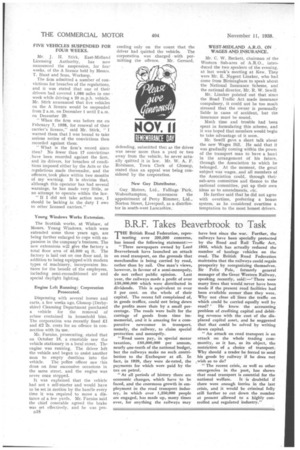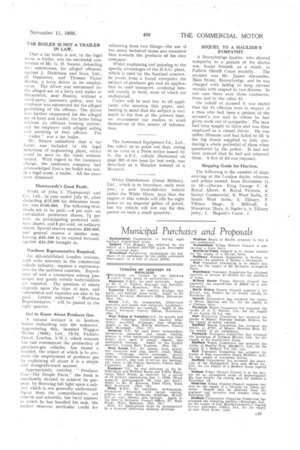B.R.F. Takes Beaverbrook to Task
Page 140

Page 141

If you've noticed an error in this article please click here to report it so we can fix it.
THE British Road Federation, repre1 seating over 200,000 concerns, has issued the following statement:— " Three newspapers owned by Lord Beaverbrook have launched an attack on road transport, on the grounds that merchandise is being carried by road, rather than by rail. One man's views, however, in favour of a semi-monopoly, do not reflect public opinion. Last year, the railways made a profit of over 138,000,000 which were distributed in dividends. This is equivalent to over 3 per cent, on the whole of their capital. The recent fall complained of, in goods traffics; could not bring down the profits more than by a small percentage. The roads were built for the carriage of goods from time immemorial, and it is amazing for a coin. parative newcomer in transport, namely, the railway, to claim special protection and monopoly.
"Road users pay, in special motor taxation, £88,000,000 per annum, nearly one-tenth of the national budget, but the railways make no such contribution to the Exchequer at all. In fact, in 1929, they were de-rated, the payments for which were paid by the tax on petrol.
"At all periods of history there are economic changes, which have to be faced, and the enormous growth in employment in the road transport industry, in which over 1,250,000 people are engaged, has made up, many times over, for anything the railways may
have lost since the war. Further, the railways have been specially protected by the Road and Rail Traffic Act, 1933, which has actually reduced the number of haulage vehicles on the road. The British Road Federation maintains that the railways could regain prosperity by reorganizing themselves, Sir Felix Pole, formerly general manager of the Great Western Railway, speaking recently, said :—` There were many lines that would never have been made if the present road facilities had been available sooner than they were. Why not close all lines the traffic on which could be carried equally well by road? ' He knew the accounting problem of crediting capital and debiting revenue with the cost of the displaced capital asset, and he suggested that that could be solved by writing down capital.
"An attack on road transport is an attack on the whole trading community, as it has, as its object, the restriction of a choice of transport. Why should a trader be forced to send his goods by railway if he does not wish so to do?
" The recent crisis, as well as other emergencies in the past, has shown that road transport is essential for the
national welfare. It is doubtful if there were enough lorries in the last crisis, and it would be criminal folly still further to cut down the number at present allowed to a highly controlled and regulated industry." That a tar boiler is not, in the legal sense, a trailer, was the successful contention of Mr. G. H. Swann, defending two summonses, for alleged offences, against J. Dickinson and Sons. Ltd., of Doncaster, and Thoinas Victor Martin, a lorry driver in its employmeat: The driver was summoned foe the alleged use of a lorry and trailer at Br tterwick, near Boston, without a third-party insurance policy, and his employer was summoned for the alleged permitting of the offence. The driver was further summoned for the alleged use of lorry and trailer, the latter being without an effiCient braking system, and his employer with alleged aiding and abetting of that offence. The "
trailer" was a• tar boiler.
Mr. Swann submitted that a tar 1)oiler was included in the legal definition of engineering plant, whicn could be used on the roads without brakes. With regard to the insurance charge, • the insurance company had acknowledged that a tar boiler was nor, in a legal sense, a trailer. All the cases were dismissed.
Thornycrofes Good Profit.
Profit of John I. Thornycroft and Co., Ltd., in year ended July 31, after deducting £13,500 for debenture interest, was £160,006. The following dividends are to be paid : —6 per cent, on cumulative preference shares, 7i per cent. on participating preferred ordinary shares, and 8 per cent. on ordinary shares. Special reserve receives £50,000, and general reserve a similar sum, leaving £45,456 to be carried forward, against £44,200 brought in.
Northern Representative Required.
An old-established London concern, with wide interests in the commercial vehicle industry, requires a representative for the northern counties. Experience of and a connection among ,passt-eger and goods vehicle bodybuilders arc essential. The question of salary depends upon the type of man, and commission and expenses are also to be paid. Letters addressed " Northern Representative" will be passed to the light quarter.
Get to Know About Producer Gas.
A natural instinct is to hesitate before embarking into the unknown. Appreciating this, Sentinel Waggon Works (1936), Ltd., 72-74, Victorid Street, London, S.W.1, which concern has just commenced the production of producer-gas vehicles, has issued a booklet, the object of which is to promote the employment of producer gas by explaining all about it in a simple and straightforward manner.
Appropriately entitled "Producer Gas—The Simple Facts," the book is excellently devised to achieve its purpose, by throwing full light upon a subject which is not generally understood. Apart from the comprehensive, yet concise and scientific, but lucid manner in which he has handled his task, the author deserves particular credit for
refraining from two things—the. use of too many technical terms and excessive bias towards the products of his own company.
Whilst explaining and pointing to the specific advantages of the H.S.G. plant, which is used by the Sentinel concern, he treats froin a broad viewpoint the subject of producer gas and its application to road: transport, confining himself mainly to facts, most of which are undisputed..
Copies will be sent free to all applicants who mention this paper, and, bearing in mind that the subject is very much to the fore at the present time, we recommend our readers to avail themselves of this source of information.
The Associated Equipment Co., Ltd„ has asked us to point out that, owing to an error in a Press notice issued by it, the A.E.C. vehicle illustrated on page 385 of our issue for last week, was described as a Matador instead of a Monarch.
White Distributors (Great Britain), Ltd., which is to introduce, early next year, a new local-delivery vehicle called the White Horse, says that the engine of this vehicle will idle for eight hours on an imperial gallon of petrol, but the vehicle will not run for this period on such a small quantity.




























































































































































